 By Ray Rivers
By Ray Rivers
July 28, 2017
BURLINGTON, ON
In a first-past-the-post parliamentary system only two political parties will ever predominate. That potentially limits the development of ideas and policies since the tendency is for the parties to become entrenched. We see this in spades south of the border where their famous time-honoured arcane system of checks and balances has devolved into little more than a battleground for partisan bickering over established positions.
That is where third parties come in – to generate new ideas and expand the discussion. Of course a proportional representative electoral system is natural habitat for third parties. But we’ve also seen the successful co-operation and contribution of third parties during times of minority government. In fact these were periods where some of our best legislation has been created.
Third parties, especially those with little hope of ever having to actually govern, can push the envelope of what is possible and make the unimaginable imaginable. That is how we got universal national health care. But once a mainstream party adopts a good out-of-the-box idea it gets the credit and power, and the third party continues to linger in the shadows. That is the story of Canada’s NDP. Always a bridesmaid and never a bride.
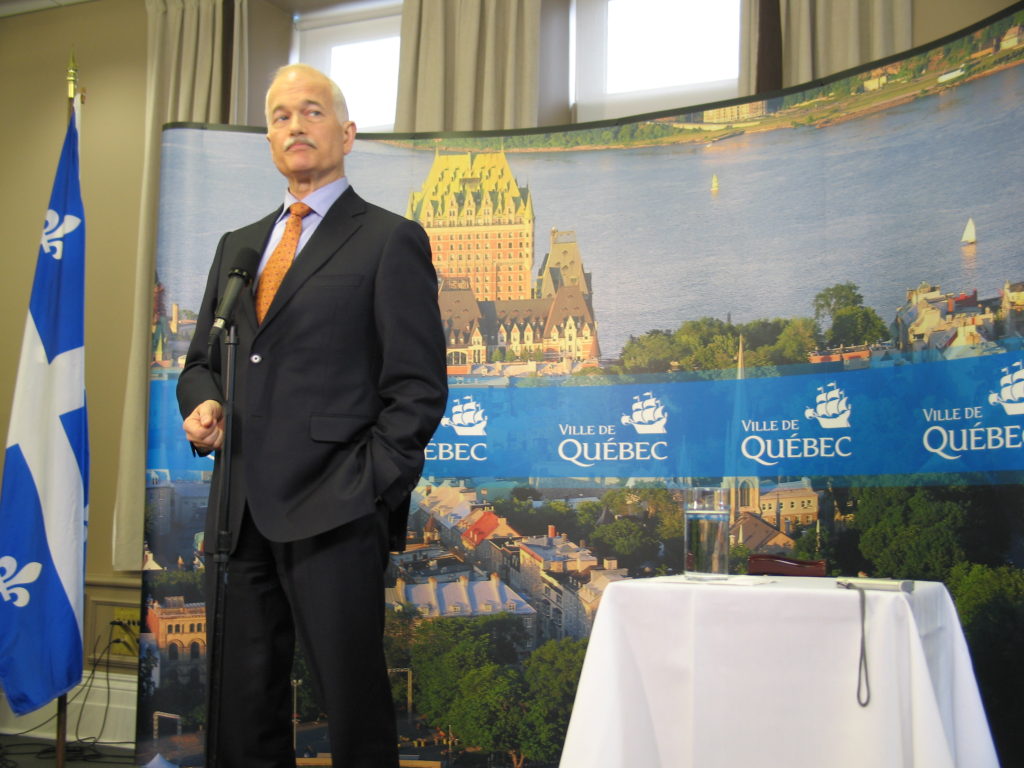
Jack Layton took Quebec with his Orange Wave but died before he got a chance to really wide that wave.
Jack Layton tried to change that scenario. Coming up to the 2011 election, Layton sold his soul to the Quebec separatists, all but promising them political sovereignty. And it worked. Disillusioned with the Bloc Quebecois and not inclined to support Harper or Ignatieff, voters in that province went Orange (NDP) in droves, and almost as a protest vote. For the first time in their 50 year history – and beyond their wildest dreams – the New Democrats got into the game as Canada’s official opposition.
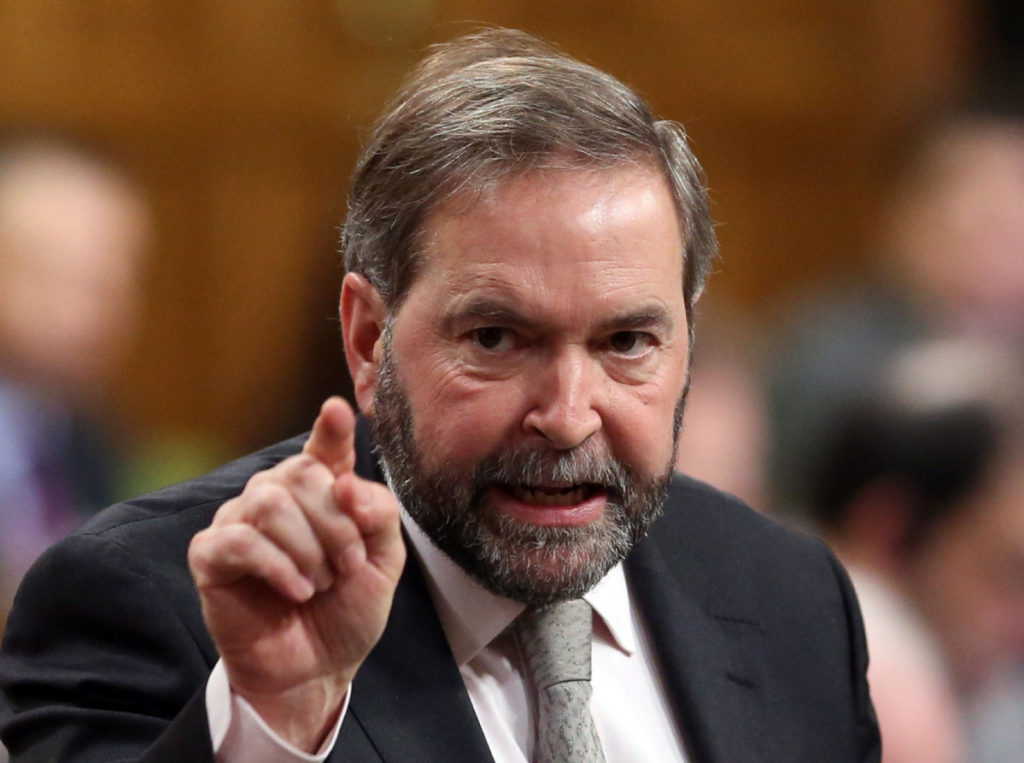
Opposition Leader Thomas Mulcair one of the best Opposition speakers the House has seen in some time. He reminded one of the great John George Diefenbaker with a beard instead of jowls.
Thomas Mulcair, replacing Layton, chose his own version of the ‘Third Way’, the political philosophy that led to Tony Blair’s string of victories in the UK. There is no right or left only the correct, the Third Way. So while he may have planned to govern from the left, he campaigned from the middle – campaigning as if he were Stephen Harper light. And he lost in a political arena filled with voters wanting a change from the previous decade of ho-hum, nasty and back-from-the-past.
So at the first gathering of the faithful, the NDP rank and file showed Mulcair the door as the party once again sought to discover its old activist self. Fresh from the pen, the elite radical left tossed the Leap Manifesto and its visions for a carbon-free Canada onto the table, as a starting point. The NDP had come home to the fringe after its brief sojourn in the big leagues.
So there are four candidates in a race even more subdued than the Tories just ran. There is less oxygen in the room now when they meet. Already a couple of potential candidates have dropped out, some have been disqualified by the onerous rules, and a whole raft of potential candidates are sitting it out. The truth is Justin Trudeau has stolen their traditional place as Canada’s left-of centre party, at least for now, and the NDP needs to go back to the drawing board… and maybe change their name.
The NDP was an experiment from the beginning, a 60’s merger between a populist agrarian-based socialist party, the CCF, and a large labour movement, the Canadian Labour Congress. After all, this kind of marriage had worked in other Commonwealth nations, Britain in particular, propelling a workers’ party into power. But Canada is a different political animal.
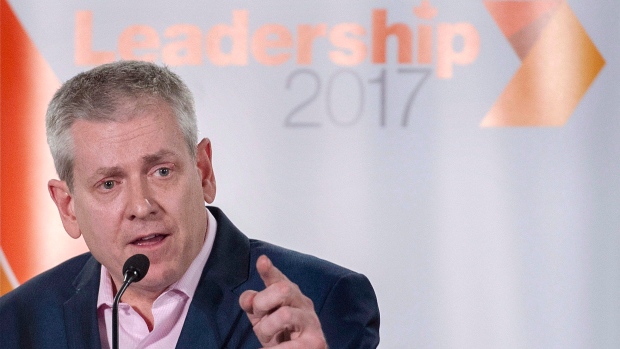
Charlie Angus – As solid a Socialist as you will find in this country. Can he win the NDP leadership and then do something with the party?
Popular northern Ontario MP Charlie Angus is the person to beat as they move towards the October vote. But as we saw with the recent Conservative leadership contest nothing is a given, especially when the NDP, like the other two main parties in their own leadership races, are using a preferential ballot. But whoever wins this contest will have an uphill climb to re-invent the NDP if it is to remain relevant as a political force.
Among other matters the party needs to consider its relationship with labour. The long-standing linkage with labour unions has likely hurt the party as much as it has ever helped, particularly as Canada continues to de-unionize. And in recent times so much of its traditional labour support has drifted to the Liberals, as unions seek to increase their influence with a sympathetic governing party.
Of course the NDP have formed sub-national governments across the country, and are currently in charge in BC and Alberta. There is a strong political following in BC, though the Greens are biting at their feet. And Alberta is a work in progress, with enough promise to force the parties on the right into a marriage of convenience. These governing experiences serve to perpetually push the national third party to become more centrist and broaden its appeal.
Yet these broadening efforts have also cost the NDP support. Others, like the Greens have sprung up with single issue campaigns which typically erode NDP support as they more effectively focus on an issue. And perhaps there is a better future jointly for both of those parties on the left.
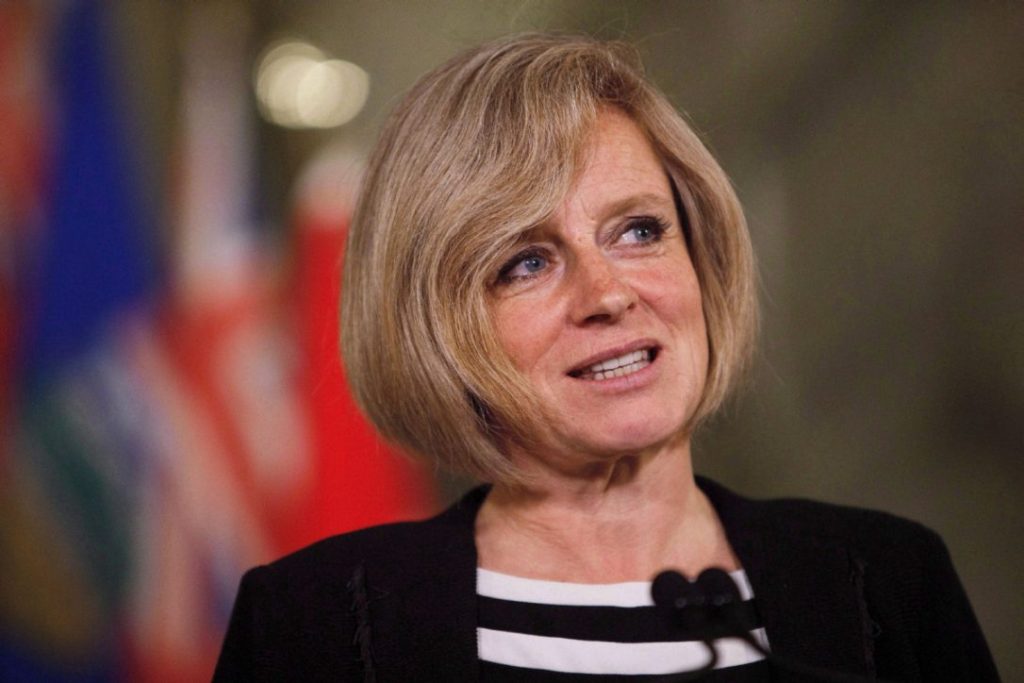
Rachel Notley – strong enough as the Premier of Alberta to force the Conservative interests in the province to join forces to beat her. Alberta’s loss if they do.
Or the NDP might consider jumping into bed with the Liberals who had, after all, stolen much of their traditional thunder in the last election. But there must also be resentment and disappointment with Mr. Trudeau’s betrayal of those dippers who voted Red as the best hope ever of achieving electoral reform, and converting their popular vote into its equivalence in seats in the national assembly.
Still, even if the New Democrats never make government, they need to take heart that they have and do make a difference. As indeed have all the other third parties who have been elected to Parliament, be they Reform, Social Credit/Creditists, Greens, or even the problematic Bloc Québécois. And for that reason alone this leadership contest should be important to all of us.
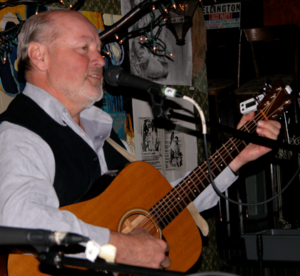 Ray Rivers writes weekly on both federal and provincial politics, applying his more than 25 years as a federal bureaucrat to his thinking. Rivers was a candidate for provincial office in Burlington in 1995. He was the founder of the Burlington citizen committee on sustainability at a time when climate warming was a hotly debated subject. Tweet @rayzrivers
Ray Rivers writes weekly on both federal and provincial politics, applying his more than 25 years as a federal bureaucrat to his thinking. Rivers was a candidate for provincial office in Burlington in 1995. He was the founder of the Burlington citizen committee on sustainability at a time when climate warming was a hotly debated subject. Tweet @rayzrivers
Background links:
NDP – Leadership – BC NDP – NDP Historical Support




















I must admit I am tired of all stripes of politicians. The system has morphed into a employment system for people willing to say whatever will get them elected as that is now the purpose of the political parties and their members. Everything else is window dressing. I believe we need to have a course correction by enacting two changes to how government works at all levels:
1. Making it illegal for any government to borrow money for program spending (i.e. government leader and cabinet are thrown out and cannot run again for election). This would force taxation, making the politicians account for the spending at the voting booth versus kicking the can down the road (like the electricity fiasco in Ontario).
2. Setting term limits on all elected officials, including senators.
Once in a while the NDP manage to elect credible, sensible, moderate leaders who possess common sense, reasonableness, and aren’t fixated on their tax and spend ideology. Alan Blakeney, Roy Romanow, Howard Pauley and Ed Schreyer are all cases in point. Tom Mulcair was cut from that mold.
Mulcair was easily the best parliamentarian and the best debater in the House of Commons since Diefenbaker. While Layton was capable of instilling passion Mulcair projected moderation, logic and fiscal responsibility. Having been a Cabinet Minister in Quebec Mulcair actually understood something about power and the importance of balanced budgets. He was adept in holding the Harper government accountable on several issues, and his performance was far superior to Justin Trudeau’s. Unfortunately, voters were more easily swayed by the Liberals’ promises of roses and “sunny times”.
The undignified way in which Mulcair was dumped at the February 2016 convention speaks volumes about the NDP’s shallowness as well as their lack of realism. You don’t dump the leader when there is clearly no obvious successor. The fact that potential candidates like Nathan Cullen and Megan Leslie are sitting on the sidelines speaks volumes about how the Party’s stalwarts feel about their electoral chances.
NDP members now have the unenviable tasks of choosing between four very nondescript candidates, none of whom inspires confidence among non-NDP supporters. Poor Charlie Angus is indeed the best of four very weak candidates. Balancing the many discordant elements within the NDP will require a lot of skills. Even if Tommy Douglas were around I’m not sure he could save this crew.
The NDP are nice people, and they mean well, but really, all they want to do is sit in a circle, hold hands and sing kumbuya. Business can’t run like that, it requires leadership, not constant consultation. A federal NDP government would be the ruin of us. They will kill off job creation in this country by raising wages beyond what small business owners can pay. They would also over regulate everything and businesses would exit this country for easier places to operate.
With the internet, we no longer just compete locally, we have competitors all over, many in places with lower costs than Canada. With our already too high payroll taxes and an NDP style Government running Ontario pushing for a 30% increase in wage costs for all small business owners, the economy couldn’t handle an Federal NDP Government.
Like I said, nice people who mean well, but no thanks.